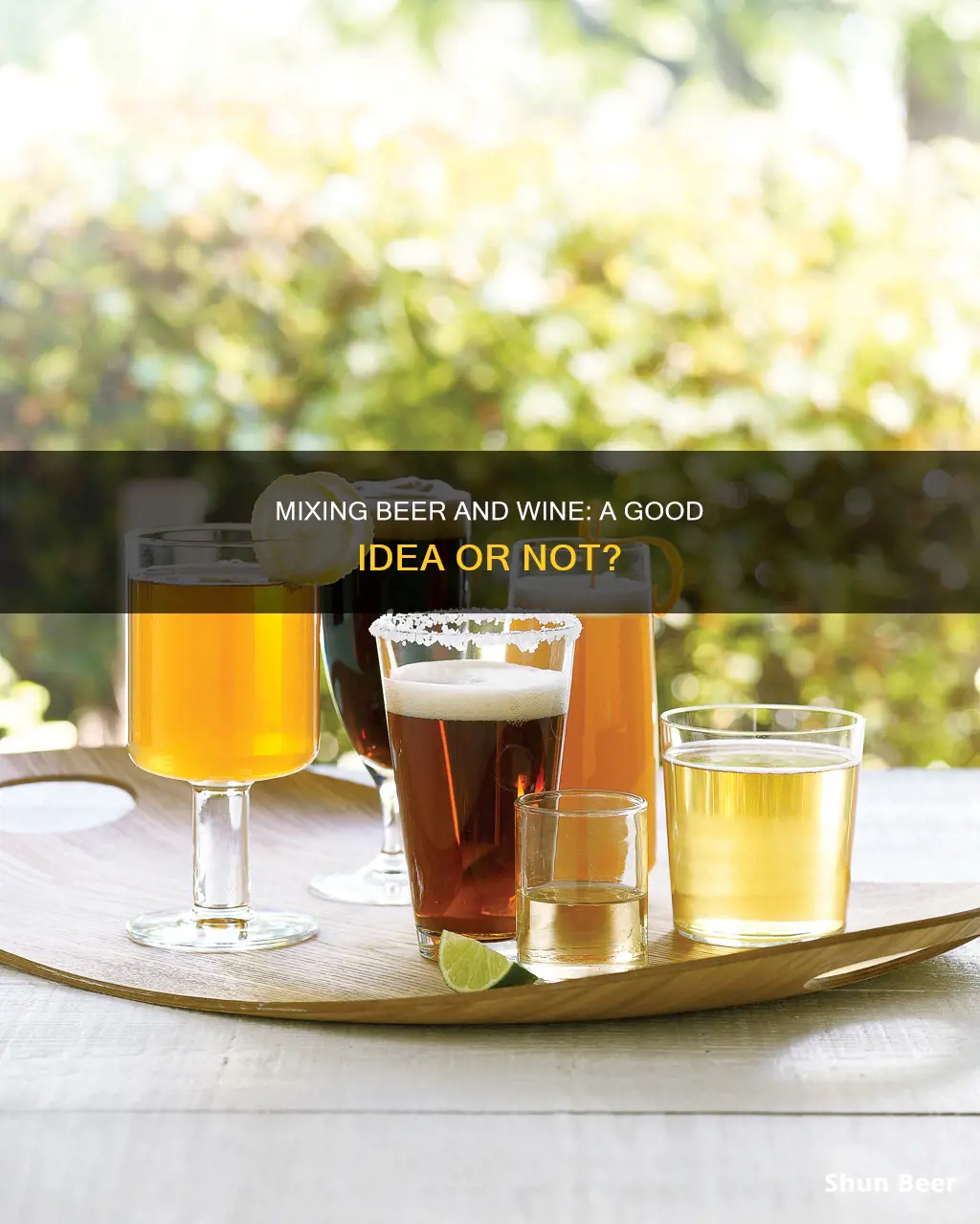
There are many old sayings that claim that the order in which you drink beer and wine can affect how drunk you get and how bad your hangover is. For example, beer before wine and you'll feel fine or beer before liquor, never been sicker; liquor before beer, in the clear. However, researchers at Witten/Herdecke University in Germany and the University of Cambridge in the United Kingdom found that there was no correlation between hangover symptoms and whether subjects drank only wine, only beer, or switched between them in either order. Instead, the best predictors of a bad hangover were how drunk the subjects felt and whether they vomited after drinking.
| Characteristics | Values |
|---|---|
| Is it okay to drink beer and wine together? | There is no scientific evidence to support the claim that drinking beer and wine together is bad for you. However, some people believe that drinking them in a particular order may affect how drunk or hungover you feel. |
| Reasons for drinking beer before wine | Some people believe that drinking beer before wine will result in a milder hangover. Others claim that drinking a carbonated drink after wine can speed up the absorption of alcohol, leading to greater inebriation. |
| Reasons for drinking wine before beer | Some people claim that drinking wine, which is usually sipped, before beer, which is often consumed in larger quantities, can lead to drinking more beer and, therefore, more alcohol. |
What You'll Learn

Beer before wine, you're fine; wine before beer, you're in the clear
There are many sayings about the order in which one should consume beer and wine, with some suggesting that drinking beer before wine will result in feeling fine, while drinking wine before beer will lead to feeling unwell. However, scientific research has found little evidence to support these claims.
The idea that "beer before wine and you'll feel fine; wine before beer and you'll feel queer" is a common belief that has been around for a long time. Some people claim that this saying holds true based on their personal experiences. One possible explanation for this is the difference in alcohol content between beer and wine. Beer typically has a lower alcohol content than wine, so starting with beer may result in slower alcohol consumption overall. Additionally, the carbonation in beer may affect the absorption of alcohol, potentially leading to faster intoxication if beer is consumed after wine.
On the other hand, others have suggested that the saying may be related to cultural or historical contexts. For example, in the past, beer was associated with the lower classes, while wine was considered a luxury enjoyed by the wealthy. So, drinking wine after beer could be seen as an improvement in social status, while the reverse could signify a decline.
Despite these theories and anecdotal evidence, a 2019 study conducted by researchers at Witten/Herdecke University in Germany and the University of Cambridge in the UK found no significant difference in hangover severity between participants who drank beer followed by wine and those who drank wine followed by beer. The study concluded that the total amount of alcohol consumed has a much greater impact on hangover intensity than the order of drinks. Individual factors such as age, sex, body weight, and drinking habits did not appear to influence hangover intensity, although vomiting and perceived drunkenness were associated with more severe hangovers.
While the saying "beer before wine, you're fine; wine before beer, you're in the clear" may persist in popular culture, scientific evidence suggests that it is the total amount of alcohol consumed, rather than the order of drinks, that primarily determines the severity of a hangover.
Beer and Levofloxacin: Is It Safe to Drink?
You may want to see also

The amount of alcohol, not the order, determines the hangover
There are many sayings about the order in which one should consume beer and wine. Some of the most common ones are "beer before wine and you'll feel fine; wine before beer and you'll feel queer", "beer before liquor, never sicker; liquor before beer, in the clear", and "beer on cider makes a good rider, cider on beer makes you feel queer". These sayings suggest that drinking beer before wine or liquor will result in a milder hangover or no hangover at all. However, modern research has disproven this myth.
A study conducted by researchers at Witten/Herdecke University in Germany and the University of Cambridge in the United Kingdom examined the effect of drinking beer and wine in different orders on hangover severity. The study involved 90 participants who were split into three groups. The first group consumed 2.5 pints of cold lager beer followed by four large glasses of chilled white wine. The second group consumed the same amount of alcohol but in reverse order. The third group, the "control group", drank only wine or beer. The participants were asked to rate their level of drunkenness and any symptoms of a hangover, such as thirst, loss of appetite, stomachache, nausea, and headache, throughout the experiment and the next morning.
The results of the study showed that the order of drinking beer and wine did not have a significant impact on hangover severity. Participants in all three groups reported similar hangover scores, regardless of the order in which they consumed the alcohol. This suggests that it is the amount of alcohol consumed, rather than the order, that determines the severity of a hangover.
Another study, which investigated whether the order of drinking wine and beer affects hangover severity, supported these findings. The study tested four different treatments: 1) beer only, 2) wine only, 3) first beer then wine, and 4) first wine then beer. The severity of hangovers was rated using an acute hangover scale, and it was found that there was no difference in hangover severity between any of the groups. This further supports the idea that it is the amount of alcohol consumed, rather than the order, that determines the severity of a hangover.
While the order of drinking beer and wine may not affect hangover severity, it is important to note that not all alcoholic beverages will have the same impact. Other alcoholic drinks, such as dark spirits, may cause more severe hangovers due to the presence of higher levels of congeners, which are natural compounds that occur due to fermentation. Additionally, individual factors such as age, sex, body weight, and drinking habits may also influence hangover intensity. However, the most important factor in determining hangover severity is the amount of alcohol consumed. To reduce the risk and severity of a hangover, it is crucial to drink in moderation and stay hydrated.
Non-Alcoholic Beer: Healthy Alternative or Just a Gimmick?
You may want to see also

Carbonation in beer makes you absorb alcohol from wine more quickly
Carbonation in beer can indeed cause you to absorb alcohol from wine more quickly. This is due to the increased pressure in the stomach that carbonation causes, which in turn forces alcohol into the bloodstream via the stomach lining. This means that ethanol hits the small intestine faster than usual.
The Science of Carbonation
Carbonation is carbon dioxide gas added to a beverage. It has been believed to speed up the movement of liquids from the stomach to the small intestine. When alcohol is consumed, this means that ethanol is hitting the small intestine faster than usual.
Studies on Carbonation and Alcohol Absorption
Some studies have shown that carbonation in drinks like champagne speeds up the rate of alcohol absorption by anywhere from 40-50%. In one study, 20 out of 21 subjects absorbed dilute alcohol at a faster rate than concentrated alcohol. 14 out of 21 subjects absorbed alcohol with a carbonated mixer faster than those without.
Other Factors in Fast Alcohol Absorption
It is important to note that carbonation is not the only factor that affects how quickly alcohol is absorbed by the body. Other factors include existing medications and health conditions, smoking, body composition, drinking on an empty stomach, high alcohol content, drinking speed, and gender.
Safety of Mixing Alcohol and Carbonated Beverages
It is safe to drink alcohol mixed with carbonated beverages in moderation. While carbonation may cause you to feel drunk faster, it does not make you more drunk at the end of the night. Alcohol is worse for you than carbonated beverages, and drinking too much can lead to short-term effects like impaired judgment and slowed reaction times, as well as long-term health issues.
Beer Drinking and Heaven: What's the Verdict?
You may want to see also

Drinking rate matters: liquor, wine, then beer
There are many old sayings about the order in which you should consume different types of alcohol. For example, the American saying goes: "Beer before liquor, never been sicker; liquor before beer, you're in the clear." However, another saying contradicts this: "Beer then wine, you'll feel fine; wine then beer, you'll feel queer." The German saying also goes against the American saying: "Bier auf Wein, lass das sein; Wein auf Bier, das rat' ich dir", which means "Beer after wine, leave it be; wine after beer, that I recommend."
These sayings are cute and easy to remember, but the order in which you drink different types of alcohol matters much less than they suggest. According to researchers at Witten/Herdecke University in Germany and the University of Cambridge in the UK, it is the amount of alcohol, not the order in which you drink, that affects the severity of a hangover. They found that participants in their study reported similar hangover scores, regardless of whether they drank beer followed by wine, or vice versa.
However, this study has some limitations. Firstly, it only used light-coloured beverages: lager and white wine. Previous studies have found that some dark spirits and drinks may make hangovers worse due to their higher congener content. Congeners are natural compounds in liquor that contribute to the colour and flavour, and have been linked to more severe hangovers. Secondly, the researchers did not include a control group of participants drinking non-alcoholic beer and wine.
While the drinking order may not matter in terms of hangovers, there could be other reasons to follow a particular drinking sequence. For example, it may be easier to gauge how much alcohol you are consuming if you stick to one type of drink. Additionally, carbonated alcoholic drinks like beer cause the body to absorb alcohol more quickly, so drinking beer before liquor may lead to faster intoxication.
So, while there is no need to worry about mixing beer and wine specifically, it is important to remember that the total amount of alcohol consumed is the main factor in determining the severity of a hangover.
Beer and Flexeril: Safe Mix or Health Risk?
You may want to see also

Beer and wine can be mixed in the same evening
However, it is important to drink responsibly and in moderation. Mixing different types of alcohol can lead to consuming more alcohol than intended, as it can be difficult to keep track of how much has been drunk. Additionally, drinking carbonated alcoholic beverages can cause faster absorption of alcohol, leading to greater inebriation. Therefore, it is advisable to be aware of the amount and type of alcohol being consumed and to drink water in between alcoholic drinks to stay hydrated.
Some people also believe that drinking beer before wine can lead to a milder hangover, while drinking wine before beer can result in a more severe hangover. This belief is based on the idea that beer is less strong than wine, and drinking it first will slow down the absorption of alcohol. However, this has not been proven in scientific studies. Individual factors such as age, sex, body weight, and drinking habits also do not appear to predict hangover intensity. Instead, vomiting and perceived drunkenness are better predictors of a severe hangover.
In conclusion, it is safe to mix beer and wine in the same evening as long as it is done in moderation and with awareness of the amount of alcohol being consumed. However, it is important to prioritize health and well-being over any drinking preferences, as excessive alcohol consumption can lead to negative consequences.
Beer and Blood Work: Can You Drink Before a CBC?
You may want to see also
Frequently asked questions
There is no scientific evidence to suggest that drinking beer and wine together will make you feel any worse than drinking either of the two alone. However, drinking too much alcohol and dehydration are the main causes of hangovers, so be mindful of your consumption and drink responsibly.
There is no evidence to suggest that the order in which you drink beer and wine will affect how you feel. The idea that drinking beer before wine will make you feel fine, but drinking wine before beer will make you feel sick is a myth.
Drinking beer and wine together can make you feel as though you haven't had as much to drink as you actually have, which may cause you to drink more. This, in turn, may lead to a worse hangover.







